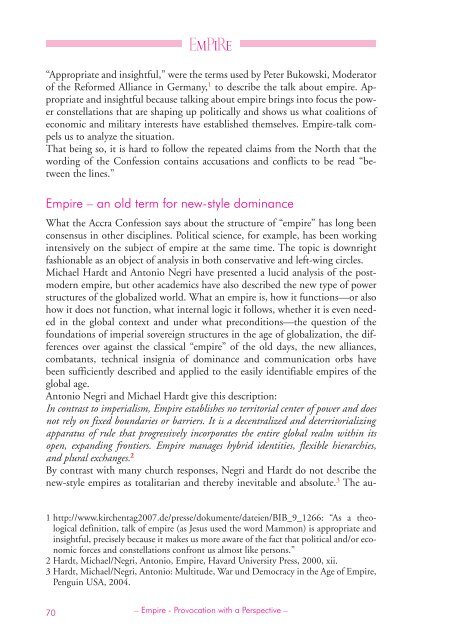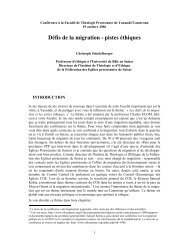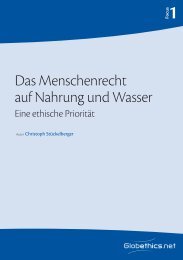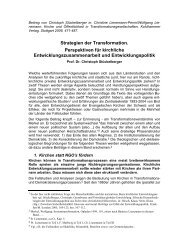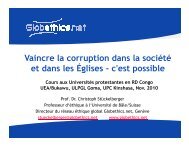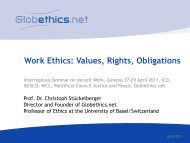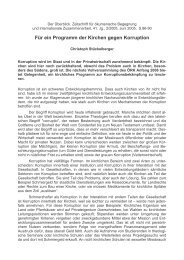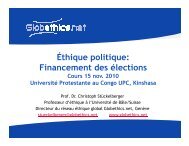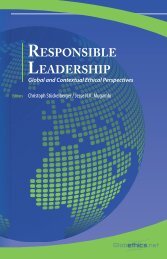BREAK THE CHAINS OF OPPRESION AND THE YOKE OF ...
BREAK THE CHAINS OF OPPRESION AND THE YOKE OF ...
BREAK THE CHAINS OF OPPRESION AND THE YOKE OF ...
You also want an ePaper? Increase the reach of your titles
YUMPU automatically turns print PDFs into web optimized ePapers that Google loves.
“Appropriate and insightful,” were the terms used by Peter Bukowski, Moderator<br />
of the Reformed Alliance in Germany, 1 to describe the talk about empire. Appropriate<br />
and insightful because talking about empire brings into focus the power<br />
constellations that are shaping up politically and shows us what coalitions of<br />
economic and military interests have established themselves. Empire-talk compels<br />
us to analyze the situation.<br />
That being so, it is hard to follow the repeated claims from the North that the<br />
wording of the Confession contains accusations and conflicts to be read “between<br />
the lines.”<br />
Empire – an old term for new-style dominance<br />
What the Accra Confession says about the structure of “empire” has long been<br />
consensus in other disciplines. Political science, for example, has been working<br />
intensively on the subject of empire at the same time. The topic is downright<br />
fashionable as an object of analysis in both conservative and left-wing circles.<br />
Michael Hardt and Antonio Negri have presented a lucid analysis of the postmodern<br />
empire, but other academics have also described the new type of power<br />
structures of the globalized world. What an empire is, how it functions—or also<br />
how it does not function, what internal logic it follows, whether it is even needed<br />
in the global context and under what preconditions—the question of the<br />
foundations of imperial sovereign structures in the age of globalization, the differences<br />
over against the classical “empire” of the old days, the new alliances,<br />
combatants, technical insignia of dominance and communication orbs have<br />
been sufficiently described and applied to the easily identifiable empires of the<br />
global age.<br />
EMpire � � � � �<br />
Antonio Negri and Michael Hardt give this description:<br />
In contrast to imperialism, Empire establishes no territorial center of power and does<br />
not rely on fixed boundaries or barriers. It is a decentralized and deterritorializing<br />
apparatus of rule that progressively incorporates the entire global realm within its<br />
open, expanding frontiers. Empire manages hybrid identities, flexible hierarchies,<br />
and plural exchanges. 2<br />
By contrast with many church responses, Negri and Hardt do not describe the<br />
new-style empires as totalitarian and thereby inevitable and absolute. 3 The au-<br />
1 http://www.kirchentag2007.de/presse/dokumente/dateien/BIB_9_1266: “As a theological<br />
definition, talk of empire (as Jesus used the word Mammon) is appropriate and<br />
insightful, precisely because it makes us more aware of the fact that political and/or economic<br />
forces and constellations confront us almost like persons.”<br />
2 Hardt, Michael/Negri, Antonio, Empire, Havard University Press, 2000, xii.<br />
3 Hardt, Michael/Negri, Antonio: Multitude, War und Democracy in the Age of Empire,<br />
Penguin USA, 2004.<br />
������������������������������������������<br />
� � � � � � ��������������������<br />
�<br />
70<br />
– Empire - Provocation with a Perspective –


